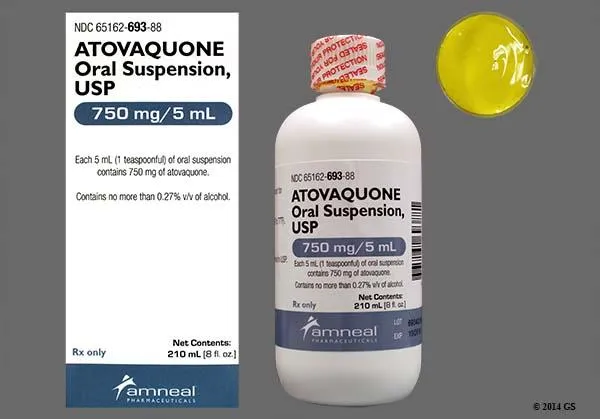Comprehensive Guide to Atovaquone: Uses, Dosage, Side Effects, and More
What is Atovaquone?
Overview
Generic Name: Atovaquone
Brand Name: Mepron, generics
Drug Group: Antiprotozoal agent
Commonly Used For
- Prevent Pneumocystis jirovecii pneumonia (PCP) in immunocompromised patients.
- Treat mild to moderate PCP in patients intolerant to trimethoprim-sulfamethoxazole.
- Treat malaria caused by Plasmodium falciparum, often with proguanil (as Malarone).
- Off-label uses include babesiosis or toxoplasmosis under specialist guidance.
Key Characteristics
Form: Oral suspension (750 mg/5 mL).

Mechanism: Inhibits dihydroorotate dehydrogenase, blocking pyrimidine synthesis in parasites.
Approval: FDA-approved (1992 for Mepron) and EMA-approved for PCP and malaria.
Indications and Uses of Atovaquone
Pneumocystis jirovecii Pneumonia (PCP): Prevents and treats mild to moderate cases in immunocompromised patients (e.g., HIV/AIDS).
Malaria: Treats uncomplicated Plasmodium falciparum malaria, typically with proguanil.
Off-Label Uses: Manages babesiosis, toxoplasmosis, or other parasitic infections under specialist supervision.
Dosage of Atovaquone
Dosage for Adults
PCP Prevention: 1,500 mg once daily with food.
PCP Treatment (Mild to Moderate): 750 mg twice daily with food for 21 days.
Malaria Treatment (with proguanil as Malarone): 1,000 mg atovaquone/400 mg proguanil once daily with food for 3 days.
Dosage for Children
PCP Prevention (1 month and older): 30 mg/kg once daily with food (maximum 1,500 mg/day).
PCP Treatment (1 month and older): 30 mg/kg twice daily with food for 21 days (maximum 1,500 mg/dose).
Malaria Treatment (with proguanil as Malarone, 5–40 kg): 8.3–10 mg/kg atovaquone/3.3–4 mg/kg proguanil once daily for 3 days.
Dosage for Pregnant Women
Dosage Adjustments
Renal Impairment: No adjustment needed; monitor for side effects.
Hepatic Impairment: Use with caution; monitor liver function.
Elderly: No specific adjustment; monitor for tolerability.
Additional Considerations
- Take this active ingredient with a meal or fatty food to improve absorption.
- Shake suspension well before use.
How to Use Atovaquone
Administration: Shake suspension well and take with a meal or fatty food; use oral dosing syringe if needed.
Timing: Take as prescribed (once or twice daily) at the same time each day.
Monitoring: Watch for signs of rash, fever, or abdominal pain.
Additional Tips:
- Avoid taking on an empty stomach to ensure efficacy.
- Report severe diarrhea or yellowing of skin immediately.
Contraindications for Atovaquone
- Patients with hypersensitivity to Atovaquone or its components.
- Patients with severe hepatic impairment.
Warnings & Precautions
General Warnings
Hepatotoxicity: Risk of liver injury; monitor liver function tests.
Rash: Severe skin reactions (e.g., Stevens-Johnson syndrome) possible; discontinue if rash worsens.
Treatment Failure: Reduced efficacy if not taken with food; ensure compliance.
Hematologic Effects: Rare anemia or neutropenia; monitor blood counts.
Parasite Resistance: Risk with improper use; follow regimen strictly.
Use in Specific Populations
Pregnancy: Category C; limited data; use only if essential.
Breastfeeding: Excreted in breast milk; avoid during treatment.
Elderly: Increased risk of side effects; monitor closely.
Children: Approved for 1 month and older; monitor growth.
Renal/Hepatic Impairment: Use cautiously in severe hepatic cases; monitor closely.
Additional Precautions
- Inform your doctor about liver disease, immune status, or other medications before starting this medication.
- Avoid antacids within 1 hour of dosing.
Overdose and Management
Overdose Symptoms
- Nausea or vomiting.
- Diarrhea or abdominal pain.
- Dizziness or rash.
Immediate Actions
Contact Emergency Services: Call 911 or seek immediate medical help.
Supportive Care: Provide hydration and monitor liver function.
Monitor: Check liver enzymes, blood counts, and symptoms.
Additional Notes
- Overdose is rare with proper dosing; store securely.
- Report persistent symptoms promptly.
Side Effects of Atovaquone
Common Side Effects
- Nausea (10–15%)
- Diarrhea (7–10%)
- Rash (5–8%)
- Headache (3–6%)
These effects may decrease over time.
Serious Side Effects
Hepatic: Jaundice or severe liver pain.
Dermatological: Severe rash or peeling skin (possible SJS).
Gastrointestinal: Persistent vomiting or bloody diarrhea.
Hematologic: Unusual bruising or bleeding.
Additional Notes
- Regular monitoring for liver function and skin changes is recommended.
- Report any unusual symptoms immediately.
Drug Interactions
This active ingredient may interact with:
Rifampin: Decreases Atovaquone levels; avoid concurrent use.
Rifabutin: Reduces efficacy; monitor if combined.
Metoclopramide: Decreases absorption; separate by 2 hours.
Antacids: Reduces bioavailability; avoid within 1 hour.
Patient Education or Lifestyle
Medication Adherence: Take this antiprotozoal agent daily as prescribed to prevent or treat infections.
Monitoring: Report rash, fever, or liver changes immediately.
Lifestyle: Maintain a balanced diet and avoid alcohol to support liver health.
Diet: Take with a meal or fatty food; avoid high-fat meals if not recommended.
Emergency Awareness: Know signs of liver failure or severe rash; seek care if present.
Follow-Up: Schedule regular check-ups to assess treatment efficacy and liver function.
Pharmacokinetics
Absorption: Poorly absorbed; enhanced 2–3 times with food; peak plasma concentration at 1–8 hours.
Distribution: Volume of distribution ~8.8 L/kg; 99% protein-bound.
Metabolism: Minimal hepatic metabolism; excreted unchanged.
Excretion: Primarily fecal (94%) and urinary (<1%).
Half-Life: 2–3 days.
Pharmacodynamics
This drug exerts its effects by:
- Inhibiting mitochondrial electron transport in parasites, disrupting energy production.
- Targeting Pneumocystis jirovecii and Plasmodium falciparum effectively.
- Offering a broad-spectrum antiprotozoal action when combined with other agents.
- Effective for prophylaxis and treatment of parasitic infections.
Storage of Atovaquone
Temperature: Store at 15–25°C (59–77°F); do not refrigerate or freeze suspension.
Protection: Keep in original container to shield from light.
Safety: Store out of reach of children.
Disposal: Dispose of unused suspension per local regulations or consult a pharmacist.
Frequently Asked Questions (FAQs)
Q: What does Atovaquone treat?
A: This medication treats PCP and malaria.
Q: Can this active ingredient cause rash?
A: Yes, rash is a risk; report severe skin changes immediately.
Q: Is Atovaquone safe for children?
A: Approved for 1 month and older; consult a doctor.
Q: How is this drug taken?
A: Once or twice daily as a suspension, with food.
Q: How long is Atovaquone treatment?
A: Varies by condition (e.g., 21 days for PCP, 3 days for malaria).
Regulatory Information
This medication is approved by:
U.S. Food and Drug Administration (FDA): Approved in 1992 (Mepron) for PCP.
European Medicines Agency (EMA): Approved for PCP and malaria.
Other Agencies: Approved globally for equivalent uses; consult local guidelines.
References
- U.S. Food and Drug Administration (FDA). (2023). Mepron (Atovaquone) Prescribing Information.
- Official FDA documentation detailing the drug’s approved uses, dosage, and safety.
- European Medicines Agency (EMA). (2023). Atovaquone Summary of Product Characteristics.
- EMA’s comprehensive information on the medication’s indications and precautions in Europe.
- National Institutes of Health (NIH). (2023). Atovaquone: MedlinePlus Drug Information.
- NIH resource providing detailed information on the drug’s uses, side effects, and precautions.
- World Health Organization (WHO). (2023). WHO Model List of Essential Medicines: Atovaquone.
- WHO’s inclusion of Atovaquone for parasitic infections.
- Clinical Infectious Diseases. (2020). Atovaquone in PCP and Malaria.
- Peer-reviewed article on Atovaquone efficacy (note: access may require a subscription).
